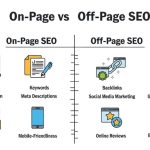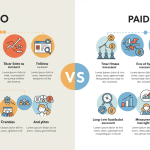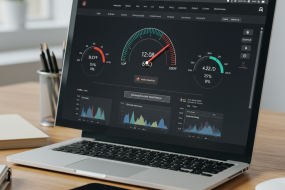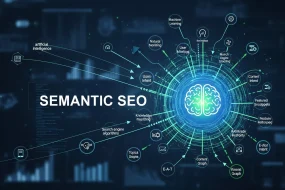
Search engine optimization has evolved dramatically over the past few years. Gone are the days when you could stuff keywords into your content and hope for the best. Modern SEO requires sophisticated strategies, data-driven insights, and consistent optimization across multiple channels.
This is where AI SEO tools come into play. These intelligent platforms can analyze vast amounts of data, identify optimization opportunities, and help you create content that both search engines and users love. Whether you’re a solo blogger or managing SEO for a large enterprise, the right AI tools can streamline your workflow and dramatically improve your results.
In this comprehensive guide, we’ll explore the best AI SEO tools available today, examine their key features, and help you choose the right solutions for your specific needs.
What Are AI SEO Tools?
AI SEO tools leverage artificial intelligence and machine learning to automate and enhance various aspects of search engine optimization. These tools can perform tasks like keyword research, content optimization, technical SEO audits, and competitor analysis with a level of speed and accuracy that would be impossible to achieve manually.
The core advantage of AI in SEO lies in its ability to process and analyze massive datasets quickly. While a human SEO specialist might spend hours researching keywords or analyzing competitor strategies, AI tools can complete these tasks in minutes while providing deeper insights.
Top AI SEO Tools for Content Creation
1. Jasper AI
Jasper AI has established itself as one of the leading AI writing platforms, offering robust SEO capabilities alongside its content generation features. The tool excels at creating SEO-optimized blog posts, product descriptions, and marketing copy that ranks well in search results.
Key features include:
- SEO-focused content templates
- Integration with Surfer SEO for real-time optimization
- Plagiarism detection
- Brand voice customization
- Long-form content generation
Jasper’s strength lies in its ability to understand context and create content that feels natural while incorporating target keywords effectively.
2. Copy.ai
Copy.ai focuses on helping marketers and content creators generate high-converting copy with built-in SEO optimization. The platform offers over 90 templates for different content types, from blog posts to social media captions.
Notable features:
- Blog post wizard with SEO optimization
- Meta description and title generators
- Keyword integration suggestions
- Multiple language support
- Team collaboration tools
3. Writesonic
Writesonic combines AI writing capabilities with comprehensive SEO tools. The platform can generate content briefs, optimize existing content, and even create entire content marketing strategies.
Standout features:
- AI article writer with SEO optimization
- Content gap analysis
- Competitor content analysis
- Real-time SEO scoring
- Integration with popular SEO tools
AI Tools for Technical SEO
4. DeepCrawl (Now Lumar)
DeepCrawl uses machine learning to identify technical SEO issues that might be missed by traditional crawling tools. The platform can analyze large websites and provide prioritized recommendations for improvement.
Key capabilities:
- Intelligent site crawling
- Core Web Vitals monitoring
- JavaScript rendering analysis
- Custom reporting dashboards
- Integration with Google Analytics and Search Console
5. Botify
Botify employs AI to analyze how search engines crawl and index websites. The platform is particularly valuable for large enterprise sites with complex technical requirements.
Notable features:
- Real keywords analytics
- Log file analysis
- Crawl budget optimization
- Content performance insights
- Technical SEO recommendations
AI-Powered Keyword Research Tools
6. Ahrefs
While not exclusively an AI tool, Ahrefs has integrated machine learning capabilities into its keyword research and content analysis features. The platform’s AI can predict keyword difficulty and suggest content opportunities.
Key features:
- AI-powered keyword suggestions
- Content gap analysis
- SERP analysis with AI insights
- Competitor keyword research
- Backlink analysis
7. SEMrush
SEMrush incorporates AI across multiple SEO functions, from keyword research to content optimization. The platform’s AI can analyze top-ranking content and provide specific recommendations for improvement.
Notable capabilities:
- AI writing assistant
- Smart keyword recommendations
- Content audit with AI insights
- Competitive analysis
- Local SEO optimization
Specialized AI SEO Tools

8. Surfer SEO
Surfer SEO uses AI to analyze top-ranking pages and provide specific optimization recommendations. The tool excels at on-page optimization and content planning.
Key features:
- Content editor with real-time optimization
- Keyword clustering
- SERP analysis
- Content audit capabilities
- Integration with popular writing tools
9. MarketMuse
MarketMuse leverages AI to help content creators build topical authority and identify content gaps. The platform can analyze your entire content library and suggest optimization opportunities.
Standout features:
- Content inventory analysis
- Topic modeling
- Competitive content analysis
- Content brief generation
- Performance tracking
10. Clearscope
Clearscope uses AI to analyze top-ranking content and provide optimization recommendations. The tool is particularly strong at helping writers create comprehensive, well-optimized content.
Notable capabilities:
- Content optimization recommendations
- Keyword relevance scoring
- Readability analysis
- Content grading
- Integration with Google Docs and WordPress
How to Choose the Right AI SEO Tools
Selecting the best AI SEO tools for your needs depends on several factors:
Budget Considerations: AI SEO tools range from free options to enterprise-level solutions costing thousands per month. Determine your budget and prioritize tools that offer the best value for your specific needs.
Team Size and Expertise: Some tools are designed for individual users, while others work better for teams. Consider your team’s technical expertise and choose tools with appropriate learning curves.
Specific SEO Needs: Different tools excel in different areas. If you primarily need content creation help, focus on AI writing tools. For technical SEO, prioritize crawling and analysis platforms.
Integration Requirements: Consider how well potential tools integrate with your existing workflow and other marketing tools you use.
Best Practices for Using AI SEO Tools
To maximize the effectiveness of AI SEO tools, follow these best practices:
Combine Multiple Tools: No single tool can handle all aspects of SEO. Use a combination of tools to cover content creation, technical optimization, and performance analysis.
Maintain Human Oversight: While AI tools are powerful, human judgment remains crucial. Always review AI-generated content and recommendations before implementation.
Stay Updated: AI technology evolves rapidly. Keep your tools updated and stay informed about new features and capabilities.
Focus on User Experience: Remember that the ultimate goal is to create content that serves your audience. Use AI tools to enhance user experience, not just to game search engines.
Monitor Performance: Regularly track the performance of content and optimizations made with AI tools. Use this data to refine your approach and improve results.
The Future of AI in SEO
AI technology continues to advance rapidly, and its impact on SEO will only grow. Emerging trends include:
- More sophisticated natural language processing
- Better understanding of user intent
- Improved prediction of search engine algorithm changes
- Enhanced personalization capabilities
- Integration with voice search optimization
As search engines become more sophisticated, AI SEO tools will need to evolve to match their complexity. The most successful SEO professionals will be those who learn to leverage AI effectively while maintaining a focus on creating genuinely valuable content.
Transform Your SEO Strategy Today
AI SEO tools represent a significant opportunity to improve your search engine optimization efforts. By automating time-consuming tasks and providing data-driven insights, these tools can help you create better content, identify optimization opportunities, and stay ahead of the competition.
The key to success lies in choosing the right combination of tools for your specific needs and using them strategically as part of a comprehensive SEO approach. Start by identifying your biggest SEO challenges, then experiment with tools that address those specific areas.
Remember that AI tools are most effective when they complement human expertise rather than replace it. Use these platforms to enhance your SEO capabilities, but always maintain a focus on creating content that truly serves your audience’s needs.


















No Comments